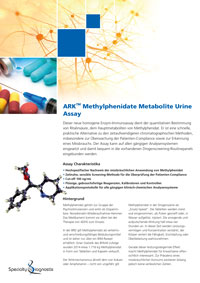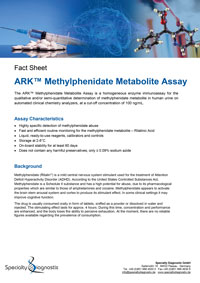The new homogeneous urine enzyme immunoassay by ARK ™ Diagnostics may be used for the quantitative determination of ritalinic acid, the main metabolite of methylphenidate. As a rapid, practical alternative to far more time-consuming chromatographic methods, it is particularly suitable for the monitoring of patient compliance or the recognition of abuse. The assay may be employed on all standard clinical chemistry analyzers and thus easily integrated into a lab’s existing drug screening routine.
ARK™ Methylphenidate Metabolite Assay
Assay Characteristics
- Highly specific detection of methylphenidate misuse in urine
- Rapid and sensitive screening method for the monitoring of patient compliance
- Cut-off 100 ng/mL
- Liquid, ready-to-use reagents, calibrators and controls
- Application protocols for all major clinical chemistry analyzers

Background
Methylphenidate, better known under its trade name Ritalin, belongs to the group of psychostimulants and acts as a dopamine or norepinephrine reuptake inhibitor. Ritalin is used primarily in the treatment of attention deficit hyperactivity disorders (ADHD).
In Germany, methylphenidate is considered as a trafficable and prescribable controlled substance and thus available by BtM prescription only. According to BfArM statistics (BfArM = Federal Institute for Drugs and Medical Devices), approximately 1.716 kg methylphenidate have been sold as tablets in 2014, with increasing tendency.
Methylphenidate is metabolized rapidly and almost completely to ritalinic acid. This metabolite is pharmacologically inactive, its half-life, however, is about twice as long as that of methylphenidate itself. The mechanism of action is similar to that of cocaine or amphetamine – there are good reasons why methylphenidate is also called “ersatz speed” in the drug scene. The tablets are usually taken orally, sniffed in powder form or dissolved in water and injected. The stimulating effect usually lasts about four hours. During this time, performance and concentration are augmented and the body loses its ability to recognize exhaustion or overexertion. Presumably, it is precisely this performance enhancing effect that makes methylphenidate so attractive to adults. However, there are as yet no reliable figures on the prevalence of abusive consumption.





